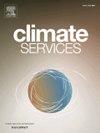季节预报对面临干旱的农民有多大帮助?基于用户的建模方法
IF 4.5
3区 环境科学与生态学
Q2 ENVIRONMENTAL SCIENCES
引用次数: 0
摘要
可用水的季节性预报对灌溉农业的决策具有明显的潜在益处。这种潜力部分取决于所提供信息的准确性。然而,实际的好处取决于信息如何在决策中使用,由谁使用,以及这些决策的结果。在本文中,我们评估了季节预报在支持灌区一级农民干旱管理决策方面的有用程度。我们模拟了灌溉农民在埃布罗盆地(西班牙)种植什么和何时种植的决定,以及水库运营商在是否削减分配给农民的水方面做出的相互关联的决定。模型农民的水源来自一个仅能满足一个灌溉季节的水库,因此他们的决定取决于该季节结束前的预期可用水量。不同的农民行为被认为是其风险厌恶程度和技术能力的函数。将季节性流量预报的价值与目前使用外推历史记录的做法以及基于气候学的参考预报进行比较,从而为这些决策提供信息。结果表明,季节可用水预报虽然有限,但具有一定的技巧。然而,不同类型的农民在不同的季节做出关键决定时,信息对农民所做决定的重要程度是不同的。因此,发现季节预报信息不能平等地服务于不同类型的农民。我们的结果说明了如何从技术和以用户为中心的角度来评估信息对服务决策的有用性。本文章由计算机程序翻译,如有差异,请以英文原文为准。
How useful are seasonal forecasts for farmers facing drought? A user-based modelling approach
Seasonal forecasts of water availability have clear potential benefit for decisions in irrigated agriculture. This potential depends in part on how accurate the information provided is. The actual benefit, however, depends on how the information is used in the decisions, by whom, and the outcome of those decisions. In this paper we assess how useful seasonal forecasts are in supporting drought management decisions by farmers at the irrigation district level. We model the decisions irrigated farmers make on what and when to plant in the Ebro basin (Spain), and the interconnected decisions reservoir operators make on whether to apply curtailments to the water allocated to farmers. The modelled farmers are supplied from a reservoir with capacity for a single irrigation season and therefore their decisions are conditioned by the expected water availability through to the end of the season. Different farmer behaviours are considered as a function of their risk averseness and their technical capacity. The value of seasonal streamflow forecasts to inform these decisions is compared against that of current practice using extrapolated historical records, as well as against a reference forecast based on climatology. Results show that seasonal forecasts of water availability have skill, albeit limited. How salient information is to the decisions that farmers make, however, differs for each type of farmer as they take key decisions at different points in the season. As a consequence, seasonal forecast information is found to not serve the various farmer types considered equally. Our results illustrate how assessing the usefulness of information to servicing a decision can be approached from a combined technical and user-centric perspective.
求助全文
通过发布文献求助,成功后即可免费获取论文全文。
去求助
来源期刊

Climate Services
Multiple-
CiteScore
5.30
自引率
15.60%
发文量
62
期刊介绍:
The journal Climate Services publishes research with a focus on science-based and user-specific climate information underpinning climate services, ultimately to assist society to adapt to climate change. Climate Services brings science and practice closer together. The journal addresses both researchers in the field of climate service research, and stakeholders and practitioners interested in or already applying climate services. It serves as a means of communication, dialogue and exchange between researchers and stakeholders. Climate services pioneers novel research areas that directly refer to how climate information can be applied in methodologies and tools for adaptation to climate change. It publishes best practice examples, case studies as well as theories, methods and data analysis with a clear connection to climate services. The focus of the published work is often multi-disciplinary, case-specific, tailored to specific sectors and strongly application-oriented. To offer a suitable outlet for such studies, Climate Services journal introduced a new section in the research article type. The research article contains a classical scientific part as well as a section with easily understandable practical implications for policy makers and practitioners. The journal''s focus is on the use and usability of climate information for adaptation purposes underpinning climate services.
 求助内容:
求助内容: 应助结果提醒方式:
应助结果提醒方式:


